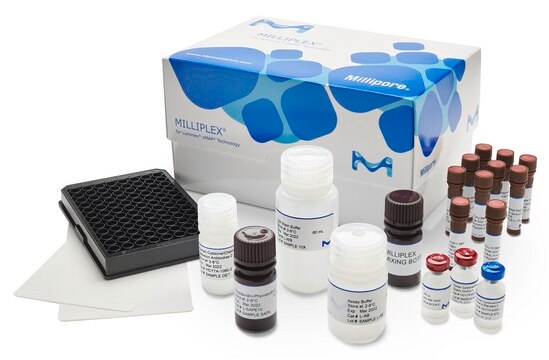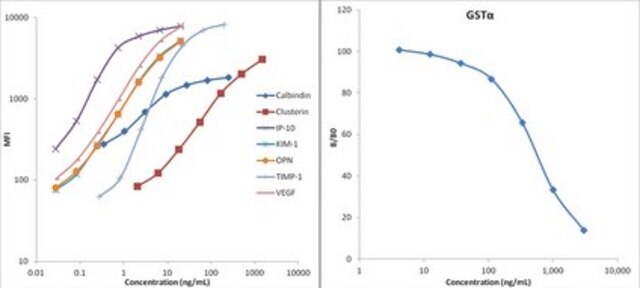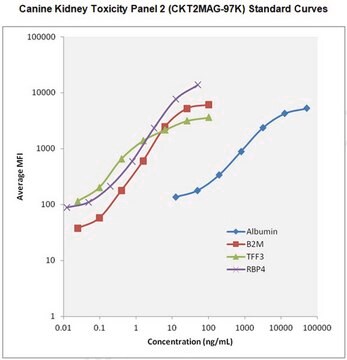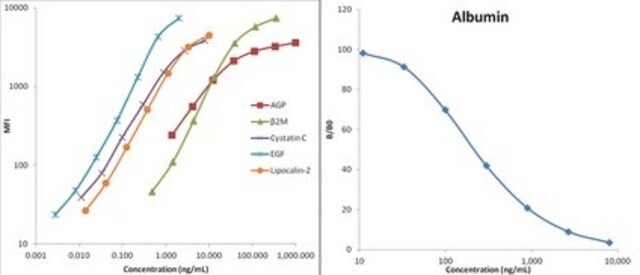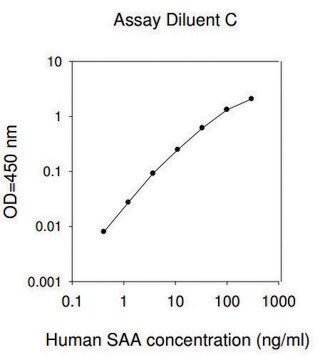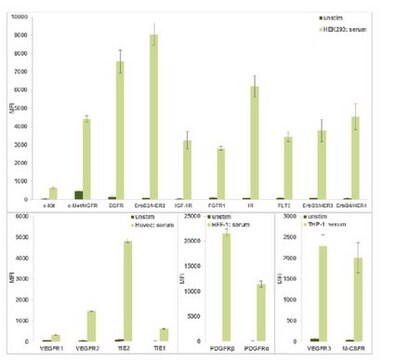CKT1MAG-97K
MILLIPLEX® Canine Kidney Toxicity Expanded Magnetic Bead Panel 1, CKT1MAG-97K
The analytes available for this multiplex kit are: Clusterin, Cystatin C, Kidney Injury Molecule-1 (KIM-1), IL-8, Lipocalin-2/NGAL, MCP-1, Osteopontin (OPN).
About This Item
Produits recommandés
Niveau de qualité
Espèces réactives
canine
Fabricant/nom de marque
Milliplex®
assay range
accuracy: 89-107%
sensitivity: 0.005-0.630 ng/mL
(All other analytes; MinDC +2SD)
sensitivity: 0.670 pg/mL
(KIM-1; MinDC +2SD)
standard curve range: 0.01-10 ng/mL
(Cystatin C)
standard curve range: 0.01-10 ng/mL
(Osteopontin)
standard curve range: 0.03-20 ng/mL
(Lipocalin-2/NGAL)
standard curve range: 0.07-50 ng/mL
(IL-8)
standard curve range: 0.07-50 ng/mL
(MCP-1)
standard curve range: 1.0-700 pg/mL
(KIM-1)
standard curve range: 1.4-1,000 ng/mL
(Clusterin)
Technique(s)
multiplexing: suitable
Méthode de détection
fluorometric (Luminex xMAP)
Conditions d'expédition
wet ice
Description générale
The MILLIPLEX® Canine Kidney Toxicity Expanded Panel 1 is to be used for the simultaneous quantification of the following 7 analytes in any combination in canine urine samples: Clusterin, Cystatin C, Kidney Injury Molecule-1 (KIM-1), IL-8, Lipocalin-2/NGAL, MCP-1, and Osteopontin (OPN). This kit uses a 96-well format, contains a lyophilized standard cocktail, two internal assay quality controls while can measure up to 38 samples in duplicate.
The Luminex® xMAP® platform uses a magnetic bead immunoassay format for ideal speed and sensitivity to quantitate multiple analytes simultaneously, dramatically improving productivity while conserving valuable sample volume.
Panel Type: Toxicity
Application
- Analytes: Clusterin, Cystatin C, Kidney Injury Molecule-1 (KIM-1), IL-8, Lipocalin-2/NGAL, MCP-1, Osteopontin (OPN)
- Recommended Sample Type: Canine urine
- Recommended Sample Dilution: 25 μL of 1:2 diluted urine for normal subjects; optimal dilutions for disease subjects should be determined
- Assay Run Time: Primary incubation of 2 hours, followed by a secondary incubation of 1 hour, both at room temperature (20-25°C)
- Research Category: Toxicology
Caractéristiques et avantages
Autres remarques
Informations légales
Mention d'avertissement
Danger
Mentions de danger
Classification des risques
Acute Tox. 3 Dermal - Acute Tox. 4 Inhalation - Acute Tox. 4 Oral - Aquatic Chronic 2 - Eye Dam. 1 - Skin Sens. 1 - STOT RE 2
Organes cibles
Respiratory Tract
Code de la classe de stockage
6.1C - Combustible acute toxic Cat.3 / toxic compounds or compounds which causing chronic effects
Certificats d'analyse (COA)
Recherchez un Certificats d'analyse (COA) en saisissant le numéro de lot du produit. Les numéros de lot figurent sur l'étiquette du produit après les mots "Lot" ou "Batch".
Déjà en possession de ce produit ?
Retrouvez la documentation relative aux produits que vous avez récemment achetés dans la Bibliothèque de documents.
Contenu apparenté
Novel kidney toxicity biomarkers expand options for acute nephrotoxicity detection. Multiplex assays measure multiple renal damage biomarkers in small sample volumes, minimizing time and costs. See how MILLIPLEX® multiplex kidney toxicity assays detected vancomycin-induced subacute nephrotoxicity in rat models.
Uncover tips and tricks to multiplexing in this guide from the experts. Learn how you can enhance the power of your research with MILLIPLEX® multiplexing, including industry guidance for immunoassays, multiplexing tips, one-day MILLIPLEX® multiplex assays for limited lab time, and more.
Multiplex toxicity assays enable researchers to simultaneously measure multiple toxicity biomarkers of various organs to gain a better understanding of toxicity. Explore how MILLIPLEX® multiplex toxicity assays are advancing research on liver injury, kidney toxicity, genotoxicity, and more.
Learn the benefits of using biomarker detection multiplex immunoassays for laboratory, companion, and agricultural animal research and explore MILLIPLEX® multiplex assays for veterinary medicine and animal health research.
Notre équipe de scientifiques dispose d'une expérience dans tous les secteurs de la recherche, notamment en sciences de la vie, science des matériaux, synthèse chimique, chromatographie, analyse et dans de nombreux autres domaines..
Contacter notre Service technique